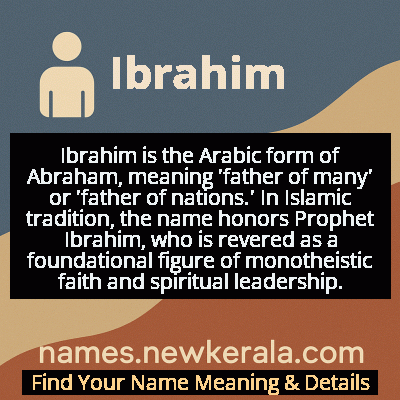Ibrahim Name Meaning & Details
Origin, Popularity, Numerology Analysis & Name Meaning of Ibrahim
Discover the origin, meaning, and cultural significance of the name IBRAHIM. Delve into its historical roots and explore the lasting impact it has had on communities and traditions.
Name
Ibrahim
Gender
Male
Origin
Muslim
Lucky Number
6
Meaning of the Name - Ibrahim
Ibrahim is the Arabic form of Abraham, meaning 'father of many' or 'father of nations.' In Islamic tradition, the name honors Prophet Ibrahim, who is revered as a foundational figure of monotheistic faith and spiritual leadership.
Ibrahim - Complete Numerology Analysis
Your Numerology Number
Based on Pythagorean Numerology System
Ruling Planet
Venus
Positive Nature
Harmonious, responsible, caring, and artistic.
Negative Traits
Overly idealistic, superficial, possessive, or jealous.
Lucky Colours
Pink, turquoise.
Lucky Days
Friday.
Lucky Stones
Diamond, turquoise.
Harmony Numbers
2, 3, 9.
Best Suited Professions
Artists, musicians, teachers, healthcare workers.
What People Like About You
Warmth, nurturing nature, artistic flair.
Famous People Named Ibrahim
Ibrahim (Abraham)
Prophet
Patriarch of Abrahamic religions, built the Kaaba with his son Ismail
Ibrahim Pasha
Military Commander
Ottoman viceroy of Egypt, modernized Egyptian military and administration
Ibrahim Rugova
Politician
First President of Kosovo, led peaceful resistance movement
Ibrahim Ferrer
Musician
Cuban singer, member of Buena Vista Social Club, Grammy Award winner
Name Variations & International Equivalents
Click on blue names to explore their detailed meanings. Gray names with will be available soon.
Cultural & Historical Significance
Throughout Islamic history, Ibrahim represents the ideal of submission to God's will and serves as a spiritual ancestor connecting Muslims to the Abrahamic tradition. His legacy extends beyond religious boundaries, influencing art, literature, and philosophy across Muslim civilizations. The name carries the weight of this rich heritage, embodying values of faith, sacrifice, and leadership that continue to inspire Muslim communities worldwide. Ibrahim's story provides a foundational narrative for Islamic identity and serves as a model for personal spiritual development.
Extended Personality Analysis
Individuals named Ibrahim are often perceived as possessing strong leadership qualities, wisdom, and deep spiritual conviction. They tend to be principled, steadfast in their beliefs, and demonstrate remarkable patience in facing challenges. The prophetic association lends an expectation of moral integrity, compassion, and a sense of responsibility toward family and community. Many Ibrahims exhibit a balanced nature—firm in their convictions yet gentle in their interactions, combining traditional values with progressive thinking.
These personality traits often manifest as reliable, trustworthy character with a natural inclination toward guidance and mentorship. Bearers of the name frequently show exceptional hospitality and generosity, reflecting the prophetic tradition of welcoming guests. They typically approach life with seriousness of purpose while maintaining warmth in personal relationships. The name carries expectations of resilience and the ability to navigate difficult circumstances with grace and faith. Many Ibrahims develop strong family bonds and community connections, often serving as stabilizing influences in their social circles.
Modern Usage & Popularity
Ibrahim remains widely popular across the Muslim world and among Muslim communities globally, consistently ranking among the top names for boys in Middle Eastern, North African, and South Asian countries. In recent decades, the name has gained increased visibility in Western countries due to Muslim immigration, maintaining its religious significance while adapting to multicultural contexts. The name's popularity shows steady consistency rather than dramatic trends, reflecting its enduring religious and cultural importance. Modern bearers often use shortened forms like 'Ibo' or 'Ibbi' in informal settings, while maintaining the full name for formal occasions. The name continues to be chosen for its deep religious resonance and the positive qualities associated with the prophet Ibrahim.
Symbolic & Spiritual Meanings
Ibrahim symbolizes the ultimate submission to divine will, representing the perfect balance between faith and action. The name embodies the concept of spiritual leadership, monotheistic purity, and the willingness to make profound sacrifices for one's beliefs. It carries connotations of hospitality, as Prophet Ibrahim was known for his generous treatment of guests, and resilience, reflecting his journey through various trials. Symbolically, Ibrahim represents the bridge between divine command and human obedience, serving as a model for personal transformation through faith. The name also signifies legacy and continuity, connecting present generations to ancient prophetic traditions and emphasizing the importance of leaving a positive impact for future generations.

